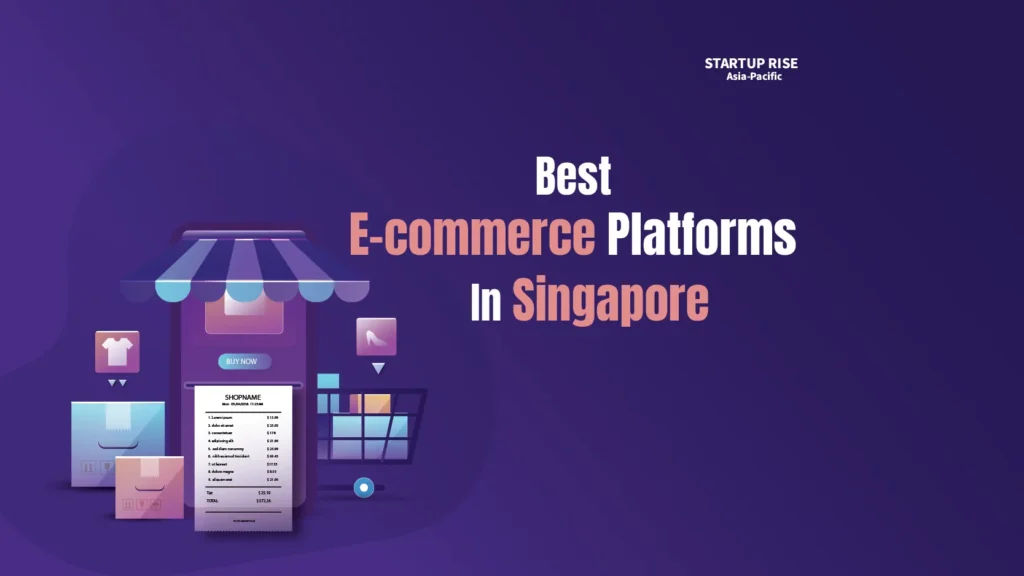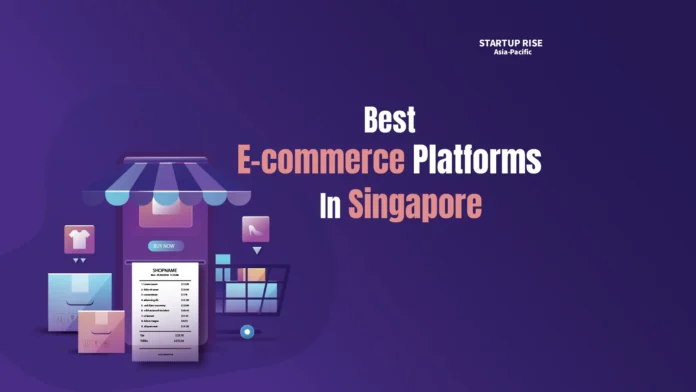
Singapore’s e-commerce market is one of the most advanced markets in Southeast Asia. Singapore’s e-commerce market was valued at US$4.3 billion in 2023. It was ranked as the 52nd largest in the world.
The E-commerce market in Singapore is experiencing rapid growth. The E-commerce market of Singapore is projected to have a compound annual growth rate (CAGR) of 5.3%. Singapore’s tech-savvy population contributes to this success. In Singapore, around 98% of residents have internet access, and 97% of those aged 15 and above identify as digital consumers.
Cashless payment methods dominate the online shopping landscape in Singapore. People often pay with debit and credit cards as well as digital wallets. The e-commerce market in Singapore has a diverse product range. Popular product categories in e-commerce platforms include electronics, furniture, fashion, food, cosmetics, and toys. Social e-commerce in Singapore is also gaining traction. It is blending social media with online shopping.
Singapore’s Government is introducing regulatory measures to enhance the safety of online transactions. The growth of e-commerce in Singapore has opened up new jobs in areas like digital marketing and data analysis. The government is supporting this sector with various initiatives. As Singapore moves toward becoming a Smart Nation, it is also building better infrastructure. eGovernment workers upgrade their skills.
Overall, Singapore’s e-commerce market is poised for continued growth, with trends like cross-border sales, mobile commerce, and video marketing shaping its future.
Table of Contents
shopee.sg
Shopee is the largest e-commerce platform in Southeast Asia and Taiwan. It was founded in Singapore in 2015 by Sea Limited. It allows users to buy and sell a wide variety of products. Shopee’s product line includes electronics, clothing, beauty items, books and furniture.
The platform uses a mobile-first approach with a user-friendly layout similar to social media. It offers integrated payment and logistics services, encouraging users to rate and share their shopping experiences. Shopee’s key features include free shipping, ShopeePay (a digital wallet with special deals) and comprehensive support for sellers, covering logistics and marketing.
Shopee aims to provide an easy, secure and fast online shopping experience which are tailored to the user’s region. The platform aspires to connect buyers and sellers in a vibrant community. It is making online shopping accessible and enjoyable for everyone.
lazada.sg
Lazada is Southeast Asia’s leading eCommerce platform. It is operating in six countries. The company connects the diverse region through advanced technology, logistics and payment systems which provide a safe and enjoyable shopping experience. Lazada offers a vast selection of brands and sellers. It leverages Alibaba’s technology since becoming part of the Alibaba Group in 2016.
Lazada improves shopping by offering fun, personalized services for each market. It helps businesses grow using its digital tools, strong logistics, and supply chain control. With fulfillment centers in 17 cities, Lazada makes a wide range of products easy to access.
The platform uses real-time data to keep up with customer needs, making it a hub for both shopping and entertainment. Built with Alibaba’s tech, Lazada’s system is made to grow and stay competitive. It also focuses on safe payments and offers many payment options to suit a region still getting used to online shopping.Overall Lazada aims to redefine retail by connecting consumers to brands and creating tailored shopping experiences.
aliexpress.com
AliExpress is an online shopping platform owned by Alibaba Group. It connects buyers with manufacturers and sellers, mostly from China. Launched in 2010, it lets small businesses sell directly to customers around the world. AliExpress is often called the “Amazon of China.” The platform offers a wide range of items which includes clothing, electronics, sporting goods and beauty products.
The platform is popular in many countries, such as the United States, Brazil, France, and Spain. It is known for its independent sellers. AliExpress doesn’t sell its products. It helps connect buyers with small businesses. Through the platform, users can easily keep track of their orders through their accounts or by using tracking numbers on shipping carrier websites. AliExpress has grown into a major cross-border B2C platform with a presence in 230 countries and regions which makes it one of the most visited e-commerce sites in Russia and a top choice in Brazil.
fairprice.com.sg
FairPrice Group was formed in 2019 by combining NTUC FairPrice, NTUC Foodfare and Kopitiam to meet changing consumer needs. The group optimizes resources and leverages strengths to provide quality, affordability and convenience in their offerings alongside NTUC Link.
FairPrice Group offers a wide range of products and services related to food with over 570 touchpoints and an online presence. Its product category includes groceries, ready-to-cook meals and food takeaways.
NTUC FairPrice is Singapore’s largest supermarket chain. It operates over 100 supermarkets and more than 160 Cheers convenience stores across the island. The brand has also partnered with ExxonMobil to run FairPrice minimarts at gas stations. The platform serves over half a million customers daily. FairPrice Group includes various formats such as FairPrice Finest, FairPrice Xtra and Unity Pharmacy. It reinforces its position as a leading retailer in Singapore.
samsung.com
Samsung is a South Korean multinational company. It is known for its electronics and is one of the largest producers of electronic devices globally. It was founded by Lee Byung-chul in 1938 as a trading company. Samsung entered the electronics industry in the late 1960s and became a major manufacturer in South Korea. The company offers a wide range of products, including home appliances, digital media devices, semiconductors, memory chips and integrated systems.
Samsung Electronics Co., Ltd. operates through three main divisions: Consumer Electronics, Information Technology & Mobile Communications and Device Solutions. The company ranks fifth in the world in terms of brand value. It accounts for about 20% of South Korea’s total exports as of 2024.
Additionally, Samsung SDS offers specialized logistics services for e-commerce. The company helps companies manage logistics needs like order processing, customs clearance and returns so they can focus on product management and marketing without worries.
uniqlo.com
UNIQLO is a clothing company. It began as a textile manufacturer in Yamaguchi, Japan in 1949. Today, it has become a global brand with over 1,000 stores worldwide. The company focuses on quality textiles and innovative clothing design.
UNIQLO’s clothing line is called LifeWear. It embodies Japanese values of simplicity, quality and longevity. LifeWear aims to provide modern, elegant apparel that serves as the foundation of individual style, featuring thoughtful details and affordable pricing. The brand continuously innovates to enhance comfort, fit and design.
UNIQLO is a part of Fast Retailing Co., Ltd.. It is a leading Japanese retail company based in Tokyo. It is the largest of Fast Retailing’s eight brands. The company is expanding in major cities to strengthen its brand presence with more than 2,400 UNIQLO stores globally. The company has currently 30 stores in Singapore. UNIQLO offers a wide range of products for men, women and children.
The brand has effectively used digital marketing and positive media coverage to boost brand awareness. Notably, UNIQLO is the official clothing partner for Team Singapore’s para-athletes at the Paris 2024 Paralympic Games. UNIQLO follows a Specialty Store Retailer of Private Label Apparel (SPA) model, managing the entire clothing value chain from materials to retail.
etsy.com
Etsy is a global online marketplace for unique and creative products. It features everything from handmade items to vintage finds. In a world full of automation, Etsy focuses on human connection. The platform helps sellers turn their ideas into businesses and connects them with buyers looking for special, personal items.
The platform empowers sellers to transform their ideas into successful businesses and connects them with millions of buyers seeking special, personal items.
The company is committed to sustainability and responsibility. It is aiming for a positive impact that extends beyond its operations. Etsy develops and enhances tools that connect millions of entrepreneurs with buyers worldwide. Etsy connects 9 million active sellers, which includes 7 million on Etsy.com and 80% of whom are women.
ebay.com
eBay is an online marketplace. The platform enables users to buy and sell a wide range of items. Its product range includes electronics, cars, fashion and collectibles. eBay does not charge insertion or final value fees for auctions and fixed-price items in Singapore. However, listing items on other eBay sites may incur fees.
Sellers can use eBay’s advanced search to check average selling prices on other platforms to research foreign markets.
eBay aims to connect millions of sellers and buyers across more than 190 markets globally. It uses technology to empower its users and foster growth while creating a positive impact on customers, communities and the planet.
ikea.com
IKEA is a global leader in home living. The company was founded in Sweden in 1943. It is known for providing affordable, well-designed products and solutions for every room in the home while promoting values like sustainability and community support.
Product safety is a top priority for IKEA. It is integrated into all aspects of its operations. The company is especially focused on ensuring the safety of children’s products. The company believes that children are the most important people in the world. IKEA has proactively developed innovative solutions to enhance product safety and user-friendliness with 75 years of experience.
In a challenging economic climate, IKEA’s 13 stores and five shopping centers in Singapore increased by 2.1%.
nsssseopet.com
Neopets is an online virtual pet game where players can adopt, customize and interact with Neopets in the world of Neopia. The game is popular for its engaging community, storytelling, pet care and social gaming elements.
Neopets has mobile games available on the App Store and Google Play. Its list of mobile games includes “Faerie’s Hope” a match-3 game where players help a lost Light Faerie and “The Island Builders,” where players rebuild a destroyed island.
The Neopets shop offers a variety of merchandise such as plush toys, pins, keychains, and t-shirts. Currently, Neopets has nearly one million monthly active users. In 2023, the company underwent a management buyout, which allowed its teams to unite and operate independently.
The classic Neopets.com continues to thrive. It offers players many activities like customizing their pets, playing mini-games, collecting rare items and chatting on the Neoboards. The Neopets Team is also working on mobile versions of the game. “World of Neopets” currently in development, will allow players to care for and battle with their Neopets in a vibrant 3D environment.
Conclusion
Singapore’s e-commerce market is expected to grow quickly in the next few years. It’s projected to reach US$5.04 billion in 2025 and US$8.4 billion by 2029. The number of online shoppers is also expected to increase, with user penetration rising from 58.8% in 2025 to 80.4% by 2029 — about 4.9 million users.
Major key trends are influencing this growth, which includes the integration of omnichannel customer experiences, the rise of video marketing and live streaming and the increasing popularity of mobile e-commerce driven by digital payment methods.
Additionally, data analytics will play a crucial role in helping businesses optimize their operations in Singapore’s E-commerce market.
As consumer preferences continue to shift toward online shopping 90% of shoppers in Singapore now make purchases online—skills upgrading initiatives like those offered by Skills Future Singapore will support workforce development in the e-commerce sector. Overall, the future of e-commerce in Singapore looks promising, with both revenue and user numbers on an upward trajectory.
What are the most popular e-commerce platforms in Singapore?
Popular platforms include Shopee, Lazada, Qoo10, Amazon.sg, and Zalora.
Which e-commerce site in Singapore offers the fastest delivery?
Shopee and Lazada often offer same-day or next-day delivery for selected items.
Which online shopping sites in Singapore offer the best deals or discounts?
Shopee, Lazada, and Qoo10 regularly host flash sales and promo campaigns.





